March 21, 2011
My Adventures in the Land of Books
Our last vacation was in the land that books forgot, so I was excited to get away to England, the storybook centre of the universe.  Whenever we go to England, we always come back with enough books to fill another suitcase (especially that one time), and this trip was no exception. Though I had less luck in the charity shops than I was hoping for– they used to be rife with 1960s Penguin Paperbacks but they’re all gone now, and now all that’s left are copies of Jenny Colgan novels that came free with a copy of Cosmopolitan. And the children’s books picks were rubbish in the charity shops, but I suppose I can imagine why the second-hand children’s book market might have its challenges.
Whenever we go to England, we always come back with enough books to fill another suitcase (especially that one time), and this trip was no exception. Though I had less luck in the charity shops than I was hoping for– they used to be rife with 1960s Penguin Paperbacks but they’re all gone now, and now all that’s left are copies of Jenny Colgan novels that came free with a copy of Cosmopolitan. And the children’s books picks were rubbish in the charity shops, but I suppose I can imagine why the second-hand children’s book market might have its challenges.
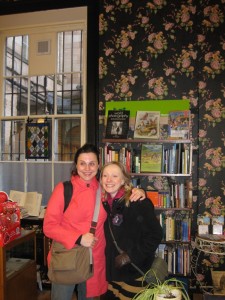 The only books I ended up getting in charity shops were I Am Not Tired and I Will Not Go to Bed by Lauren Childs at the Oxfam in Ilkley, and Tyler’s Row by Miss Read at The Panopticon Shop in Glasgow (which is a charity shop to rebuild a theatre that burned down in 1938, and we sort of got turned off their cause when they made Stuart wait out in the rain with the pram). I also got a Brambley Hedge treasury at the Oxfam in Fleetwood.
The only books I ended up getting in charity shops were I Am Not Tired and I Will Not Go to Bed by Lauren Childs at the Oxfam in Ilkley, and Tyler’s Row by Miss Read at The Panopticon Shop in Glasgow (which is a charity shop to rebuild a theatre that burned down in 1938, and we sort of got turned off their cause when they made Stuart wait out in the rain with the pram). I also got a Brambley Hedge treasury at the Oxfam in Fleetwood.
And though I didn’t end up buying anything, the Oxfam Bookshop in Glasgow was beautiful– 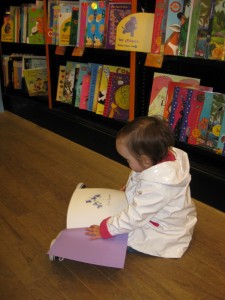 much more boutique than charity shop. It was in the same square as the massive old building (now vacant) that used to house Borders, and I was informed that the loss of that store had been a tragedy– it had been a wonderful place. We also had a good time in the Waterstones in Glasgow, which looked like not much from the outside, but as I rode the escalator down to the lower level, revealed itself to have this hidden middle section between the two floors, sort of like the half-floor in Being John Malkovich, and also a coffee shop, with made my reluctant partner in bookshopping a very happy man. We found the children’s section, and Harriet hurled picture books, and then ate part of a sandwich that she found on the floor.
much more boutique than charity shop. It was in the same square as the massive old building (now vacant) that used to house Borders, and I was informed that the loss of that store had been a tragedy– it had been a wonderful place. We also had a good time in the Waterstones in Glasgow, which looked like not much from the outside, but as I rode the escalator down to the lower level, revealed itself to have this hidden middle section between the two floors, sort of like the half-floor in Being John Malkovich, and also a coffee shop, with made my reluctant partner in bookshopping a very happy man. We found the children’s section, and Harriet hurled picture books, and then ate part of a sandwich that she found on the floor.
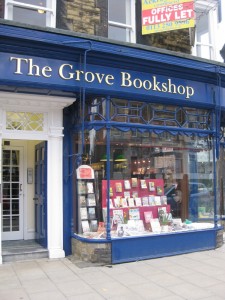 I was thrilled to discover The Grove Bookshop in Ilkley, because independent bookshops are few and far between even in England, and also because this one was bustling. The store has gorgeous window displays, a great selection, and seemed like a thriving community hub. There was a line-up at the till, and another woman there to pick up her special order. I delighted in the selection of Penguin merch, and bought a tote bag, and also Old Filth by Jane Gardam (and now I have to read The Man in the Wooden Hat). I also like The Grove Bookshop in Ilkley because their website boasts a “fast and efficient ordering system [which] means the vast majority of customer orders arrive the following day.”
I was thrilled to discover The Grove Bookshop in Ilkley, because independent bookshops are few and far between even in England, and also because this one was bustling. The store has gorgeous window displays, a great selection, and seemed like a thriving community hub. There was a line-up at the till, and another woman there to pick up her special order. I delighted in the selection of Penguin merch, and bought a tote bag, and also Old Filth by Jane Gardam (and now I have to read The Man in the Wooden Hat). I also like The Grove Bookshop in Ilkley because their website boasts a “fast and efficient ordering system [which] means the vast majority of customer orders arrive the following day.”
We spent our second-last day in London, and had scheduled bookshops a-plenty. I was so happy 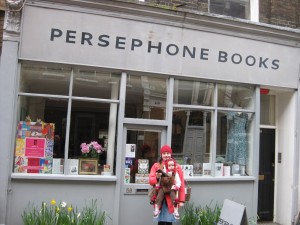 to have a chance to visit Persephone Books, and actually, I’m grateful that budget constraints forced a limit of one book only, or else I would have bought the place out. Their books are so lovely, the shop so homey (but
to have a chance to visit Persephone Books, and actually, I’m grateful that budget constraints forced a limit of one book only, or else I would have bought the place out. Their books are so lovely, the shop so homey (but 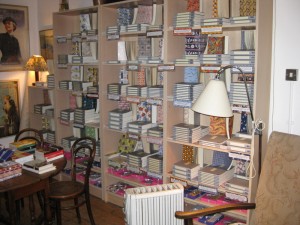 crowded! With Persephone books! Can you imagine anything more wonderful?), and I wanted to paw everything. To keep my fellow-travellers happy, I’d pre-selected my purchases so there was less browsing than you might imagine, but if I’d started, I never would have left and would no longer have a family.
crowded! With Persephone books! Can you imagine anything more wonderful?), and I wanted to paw everything. To keep my fellow-travellers happy, I’d pre-selected my purchases so there was less browsing than you might imagine, but if I’d started, I never would have left and would no longer have a family.
I also enjoyed visiting the London Review Bookshop, which was not too far away. 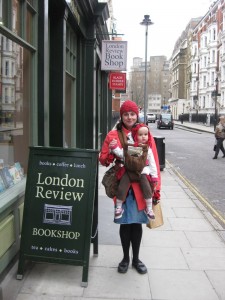 The Cake Shop proved disappointing, sadly, as it was too small to accommodate Harriet’s stroller or Harriet, and was crowded with people discussing existential things who probably didn’t want to listen to Harriet talk about her bum. I bought The Tortoise and the Hare here, though I’d been debating another Rachel Cusk instead, being that day in the thralls of her book The Lucky Ones. And I am a little bit sorry now that I didn’t get the Rachel Cusk books, because she’s so great, and I never found another of her novels in a bookshop the rest of the time we were in England.
The Cake Shop proved disappointing, sadly, as it was too small to accommodate Harriet’s stroller or Harriet, and was crowded with people discussing existential things who probably didn’t want to listen to Harriet talk about her bum. I bought The Tortoise and the Hare here, though I’d been debating another Rachel Cusk instead, being that day in the thralls of her book The Lucky Ones. And I am a little bit sorry now that I didn’t get the Rachel Cusk books, because she’s so great, and I never found another of her novels in a bookshop the rest of the time we were in England.
 Under Waterloo Bridge, I was happy to see the booksellers again, as well as a bit of sunshine. I didn’t buy anything because nothing immediately struck my eye, and because Stuart and Harriet were being very patient but I didn’t want to push them too far. I am sure if I’d browsed just a little while longer, I would have come up with one treasure or another. (I also wonder if the fact that I found less treasures amongst the used books this trip is because it’s now been a few years since I bought everything Margaret Drabble ever wrote.)
Under Waterloo Bridge, I was happy to see the booksellers again, as well as a bit of sunshine. I didn’t buy anything because nothing immediately struck my eye, and because Stuart and Harriet were being very patient but I didn’t want to push them too far. I am sure if I’d browsed just a little while longer, I would have come up with one treasure or another. (I also wonder if the fact that I found less treasures amongst the used books this trip is because it’s now been a few years since I bought everything Margaret Drabble ever wrote.)
We spent the rest of our London day at The Tate Modern, and I enjoyed exploring 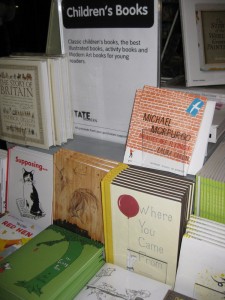 both its bookshops with their wonderful selections of children’s books. It was especially exciting to see Sara O’Leary‘s beautiful Where You Came From on display, amidst some fine company.
both its bookshops with their wonderful selections of children’s books. It was especially exciting to see Sara O’Leary‘s beautiful Where You Came From on display, amidst some fine company.
We spent our last day in Windsor, where I tried and failed to find a bookish treasure in the charity shops (including a wonderfully stocked Oxfam Bookshop, but everything good they had, I had already). We stopped in at the Windsor Waterstones and bought Harriet The Gruffalo and Alfie’s Feet, and I tried and failed to find a Rachel Cusk novel to buy, just as I would do the next day at the airport. Regrets, I’ve had a few.
But not too many. Our trip was full of bookish wonder. I arrived home with a most respectable stack, and what’s more, I’ve since read each and every one of them.
March 14, 2011
Ephemeral, yet eternal
My husband told a story at dinner the other day that involved a coyote and a mountain lion. “Like in Fauna,” I said, and we talked about the characters in this book we both read months ago, then we marvelled at how much the book had stayed with both of us. It’s not every book that does that, taking over dinner conversation as you put the pieces of the plot back together in your memory, and I continue to believe that Fauna is a really exceptional novel. That it is exceptional and never won any big book prizes, however, is to my mind no contradiction.
Fauna was exceptional for many reasons as a book, but not as much as an example of the novel form, and I think this is the reason it did not win any prizes. That it didn’t win prizes is not to say that it’s not a worthy book, but that a worthy book didn’t win a prize is also not to say it was robbed. Prizes are not the sole determinate of worthiness. And I’ve been thinking of this lately, considering the number of books I read that are considered unrecognized because they’re not short or longlisted by Giller and the like. The notion of the “snub”, the entitlement behind that notion, as though everyone deserves to be a winner. As though prizes were handed out on an assembly line, when really sometimes it’s the books that seem to be produced that way, so can you really be surprised when yours isn’t a winner?
But what I really mean to say is that there is a place for these books, all those books I read last year, for instance, that will never win a prize and should never win a prize, but that I thoroughly enjoyed reading anyway. That to be read is to be recognized, and I know it doesn’t come with much of a paycheque, but it’s everything, even without a gala. The ordinary couple discussing your story over macaroni is what you’re writing for, and the shelves upon which your book will forever dwell, and the dust that will gather on its pages over time to be blown away the odd time the book is opened– this is what you’re signing up for. The way the story will live on in readers’ minds, the connections they’ll draw between your story and others, and world outside the bookshelves, even. Something oddly ephemeral, yet eternal, less quantifiable than a grand prize win, but it matters, and it means your book matters, even if you didn’t win.
March 8, 2011
Now I'm dying to know what stroller she chose…
“Life with small children means you can’t be too picky or precious about how you read. I need solitude and silence to write but can read anywhere. My main concern, when buying a stroller, was finding one I could manoeuvre with one hand, so that I was able to push the sleeping baby and hold a book at the same time.” –Maggie O’Farrell, on mixing reading with domestic drudgery (which is the story of my happy life, incidentally).
February 16, 2011
Light at the end of the tunnel
 On Saturday, we are going to England, baggage handler strike notwithstanding, and don’t worry, I have a new spring coat (the Christine trench, in geranium) because the weather is calling for rain. We are going for two weeks! I have never gone on a two week vacation in adulthood– this is a monumental occasion. I am exited about numerous things, and terrified about others (round-abouts!). But mostly at the moment, I am excited about books. I had a bunch of books to read for various reasons in the last two weeks, and then all my Toronto Library holds came in at once, so that reading is about all I’ve been doing this last while. But as soon as I’m finished with my final library book, I am going to read magazines until our departure, because, of course, I have to start every journey with a fresh book. It’s a superstition of mine.
On Saturday, we are going to England, baggage handler strike notwithstanding, and don’t worry, I have a new spring coat (the Christine trench, in geranium) because the weather is calling for rain. We are going for two weeks! I have never gone on a two week vacation in adulthood– this is a monumental occasion. I am exited about numerous things, and terrified about others (round-abouts!). But mostly at the moment, I am excited about books. I had a bunch of books to read for various reasons in the last two weeks, and then all my Toronto Library holds came in at once, so that reading is about all I’ve been doing this last while. But as soon as I’m finished with my final library book, I am going to read magazines until our departure, because, of course, I have to start every journey with a fresh book. It’s a superstition of mine.
I am going to take Jean Webster’s Daddy Long Legs with me to read, and on a six hour flight with a toddler, my goal is to read at least five pages. Once we’re settled and Harriet is in the care of her grandparents, however, there will be reading time aplenty (fit in around trips out for cream teas). I am also going to read my final Canada Reads Independently book, Lynn Coady’s Play the Monster Blind, and I am bringing an ARC of Timothy Taylor’s new book The Blue Light Project.
Whilst in England, I plan on buying Burley Cross Postbox Theft by Nicola Barker, a novel by Rachel Cusk (but which. Any suggestions? I’ve only read Arlington Park and A Life’s Work), and a very odd book called Felicity and Barbara Pym by Harrison Solow, which isn’t actually British, but oh well. I will probably buy many other books too, especially since we are going to visit the London Review Bookshop (which is also a cake shop).
Once I’m home again, there’s a packed shelf of books I’m looking forward to bringing in the spring with, books that are too big for travel: Allison Pearson’s I Think I Love You, the new PEN Anthology Finding the Words, and Zsuzsi Gartner’s story collection Better Living Through Plastic Explosives. Among others, oh yes. Many, many others.
February 8, 2011
Dear Author, I don't want you to visit my book club
 I don’t want an author to visit my book club. Perhaps because my book club is more vicious than most, but I still can’t imagine a book club in which conversation could flow easily in an author’s presence. Because how do you talk about the parts of the books that suck? How can the group vehemently disagree on the book’s quality if naysayers are too polite to speak up? How can you speculate as to the author’s intentions, and where they went wrong? How can the book be viciously attacked, therefore provoking the book’s most passionate defenders to step up? And what if the author ate all the guacamole?
I don’t want an author to visit my book club. Perhaps because my book club is more vicious than most, but I still can’t imagine a book club in which conversation could flow easily in an author’s presence. Because how do you talk about the parts of the books that suck? How can the group vehemently disagree on the book’s quality if naysayers are too polite to speak up? How can you speculate as to the author’s intentions, and where they went wrong? How can the book be viciously attacked, therefore provoking the book’s most passionate defenders to step up? And what if the author ate all the guacamole?
I understand why authors do attend book clubs, and why book clubs want them to do so– the arrangement is mutually beneficial. Authors get book sales and club members get filler, which it seems book clubs are ever after anyway. Though I do wish that book club members would have a little more confidence in their own skills as readers so that meetings did not have to contain merely filler. That they could think up their own discussion questions, for example (and in my club, these are mainly along the lines of, “All right, what’s up with this bit I couldn’t understand?”) Let their own conversation sustain the meeting, and if author visits are desired, have them at a supplementary meeting– certainly these visits would only enhance subsequent discussion. But the discussion will suffer if the author is sitting there for it.
I raise this matter in regard to Canada Reads, and Charlotte Ashley noted the same thing in her summation yesterday. That for the first time, authors have been sitting in on the entire Canada Reads process, and I don’t think it’s done the program any good. I liked the initial plan of having readers champion their favourite books for an “essential books of the decade” list, but things went askew when actual authors got in on the action. And authors got so in on the action, that their personalities became inseparable from the books in question. Relationships through social media developed so that it was impossible for many to read these books without a conflict of interest. The books themselves ceased to be the point at all.
As I wrote in October, “If your book really was one of the essential books of the past decade, couldn’t you rely on your passionate readers to promote it? And if you don’t have those passionate readers, then, um, maybe your book wasn’t one of the essential books of the past decade?” As Charlotte Ashley wrote yesterday, “if there was an elephant in the room [in yesterday’s “debates”, surely it was the CBC’s repeated insistence that this competition was about finding the “most essential” book of the last decade whilst gesturing at a stack of books nobody has ever heard of.”
Unless is the one book here that has any chance of essential-ness. I haven’t read The Best Laid Plans, but Charlotte didn’t have much to say about it, and she’s a pretty smart reader. I read Essex County Book 1, and it was interesting– I’d suggest it had more ambiguity than any of the other Canada Reads books, save for Unless, but still, not quite an essential pick. The Bone Cage was a good first novel, but one with many problems. Like The Birth House, it’s a book whose problems I wouldn’t take great care to deliberate on, except that now someone is going around claiming it’s the essential Canadian book of the decade and it absolutely isn’t. The whole thing is kind of ridiculous.
What’s more ridiculous though is that no one having this conversation. I’ve refrained from saying anything until now, because I don’t like to talk shit about books, but we’re all being far too polite now, and I fear that authors attending our book club is most of the reason why. It’s why book bloggers are celebrating these books without question, not a word of criticism, though there is plenty to criticize, but how can we criticize when the author is our friend on Facebook, and our favourite Twitter pal?
I believe passionately in the role of book bloggers in contributing to literary conversation, that (to paraphrase V. Woolf) ““The standards we raise and the judgements we pass steal into the air and become part of the atmosphere which writers breathe as they work.” Of course, I’ve always appreciated connecting with authors through blogging, the writer googling themselves at midnight on a Friday night and sending an email of thanks for my review– I love that. But when the author shows up on my doorstep wrapped up on a ribbon, bearing their book on a silver platter along with a cupcake, well then, it’s not about the book anymore.
I fear that the infusion of authorial presence in the online world is compromising what bloggers have to say, and readers and writers have a lot to lose by that.
February 3, 2011
Mastering subtlety
“Bookish people, who are often maladroit people, persist in thinking they can master any subtlety so long as it’s been shaped into acceptable expository prose.” — from Unless by Carol Shields
January 11, 2011
The most odious of book reviewing acts
Last week, I committed the most odious of book reviewing acts: I wrote the line “Kate Atkinson is one of the best contemporary novelists in the English language” without any qualification. Rendering the line meaningless, though I meant every bit of it, but I was still too drunk on the sheer joy of having read Kate Atkinson to actually go to the effort of explaining myself. And even though I’m very tired right now because there is a small person in my house who has been coughing all night, all week, I want to rectify my misstep. I want to tell you why Kate Atkinson is one of the best contemporary novelists in the English language.
She has an ear for the peculiarities of speech, of regional dialects and expressions. She can write whole conversations between characters who never use words with more than one syllable, and the words they use is usually “fuck”, and it’s clear that she delights in the trick of it, she hears the poetry. She creates voices, and it’s from these voices that her characters emerge whole. Her narratives inhabits these characters’ brains, and no two voices sound the same– in her latest Started Early, Took My Dog, we find our favourite hardened Private Detective, a female middle-aged former police-superintendent, an aging actress in the throes of senility, plus all the people who surround these people, perspectives shifting to show everybody from every angle. So a panorama, but with a soundtrack, which is a regular cacophony, but music more than noise.
Her narratives are whimsical, delightful– Behind the Scenes at the Museum begins upon the instant of Ruby Lennox’s conception, her exclaiming, “I exist!” And also contains the line “Albert collected good days the way other people collected coins, or sets of postcards”, which is my definition of pure light. In Started Early, Took My Dog, we celebrate afternoon teas, and there are plenty of scones, but then let’s examine Britain’s underside: corrupt police officers, neglected children, murdered woman (with blood and gore), inequality, poverty, heartbreak and abject loneliness. This book contains an epigraph by the Yorkshire Ripper. Kate Atkinson never flinches, in fact, at times she borders on sensational, but her characters are so real, and their language so unbelievably rich that we give it to her.
She fixates on the past, every single one of her books jumping back in time as though it’s just as simple as looking over one’s shoulder. The past is always there, its mysteries leaking into the present day, its unsolved crimes contaminating the soil. And yet at the same time, she’s so much a writer of the present, a chronicler, her books remarkably current, their pop-culture references inconspicuously embedded within the stunning prose. The stories she tells are of the way we live now, but within these stories she loves the best bits, and what’s sepia-toned is never sentimental– Atkinson’s past is never an idyll. Sanctuary is only to be found in the stories we tell, the connections we find, in the sense we make of the chaos after the fact.
January 11, 2011
Making Light of Tragedy gets made over
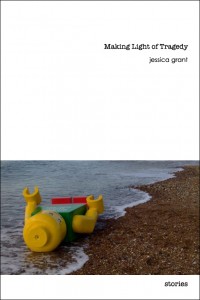 Seriously, there is nothing the Vicious Circle can’t do. We decide we don’t like the cover of Jessica Grant’s Making Light of Tragedy? Fine. Our Patricia makes another one. And we love it.
Seriously, there is nothing the Vicious Circle can’t do. We decide we don’t like the cover of Jessica Grant’s Making Light of Tragedy? Fine. Our Patricia makes another one. And we love it.
January 10, 2011
The Bob Dylan of children's authors
“This may sound disingenuous, but here’s the thing: When you are a small child besotted with books, the books themselves– especially the ones you love the best–are autonomous things, concrete yet abstract, like the stuffed animals and building blocks that help you travel to places where only you can go. At bedtime, you don’t ask your mom, “Read me some E.B. White.” You ask for Stuart Little, or Charlotte and Wilbur. You ask for a dog story; for Pippi, Babar, or–nowadays–Toot and Puddle. Your favourite characters–you know them. From a mile away, you could spot the Man in the Yellow Hat, Mrs. Mallard, Olivia or Ferdinand the bull; but H.A. Rey, Robert McCloskey, Ian Falconer, and Munro Leaf–who the heck are they? Authorial celebrity is sabotaged yet further when picture books lose their jackets… they shed their authors’ biographies as well. Many prolific children’s authors are also prone to changing dance partners–that is, illustrators– making their books even harder to see as distinctly their own. (Dr. Seuss may be the exception to this rule. Children become aware of him as a uniquely creative individual, perhaps because they hear their parents call the guy “a genius”. He’s the Bob Dylan of children’s authors, too eccentrically, definitively… well, Seussian… to be confused with anyone else.) “– Julia Glass, “Roar and More” from Bound to Last: 30 Writers on their Most Cherished Books.
January 5, 2011
You have to be a speedy reader
 I’ve long followed the dictum of Dr. Seuss who wrote in his great work I Can Read With My Eyes Shut, “You have to be a speedy reader because there’s so so much to read.” I’ve also come under the influence of Art Garfunkel (naturally), who keeps an online list of books he’s read since 1968. (I wish I had kept such a list online. My own “Books Read Since 2006” disappeared with my hard drive in June 2009). And however much I enjoyed Steven Beattie’s post calling for slow, considered reading, for an end to the competitive reading fad (and, for those of you who get out more than I do, such a thing actually exists), I must now mount my own defence of the speedy read, because it’s the only way for me.
I’ve long followed the dictum of Dr. Seuss who wrote in his great work I Can Read With My Eyes Shut, “You have to be a speedy reader because there’s so so much to read.” I’ve also come under the influence of Art Garfunkel (naturally), who keeps an online list of books he’s read since 1968. (I wish I had kept such a list online. My own “Books Read Since 2006” disappeared with my hard drive in June 2009). And however much I enjoyed Steven Beattie’s post calling for slow, considered reading, for an end to the competitive reading fad (and, for those of you who get out more than I do, such a thing actually exists), I must now mount my own defence of the speedy read, because it’s the only way for me.
It comes naturally to me, reading books quickly. For a while, I tried to slow down, but it made me miserable. When I read, I find that I’m not racing to the next book as much as I’m barrelling through the book I’m in, and I love the momentum. I love taking in a book all at once, or as much as possible, in one sitting. Devouring, live and whole. The way blood pumps through my veins is how I like to read my books, pulsing, surging, singing, vital.
I love how reading one book after another illuminates the most curious connections. I love how reading quickly permits such breadth, and bizarre reading tangests for the fun of it: Barbara Pym, all the Mitfords, my Judith Viorst-a-thon etc., and still keep up on what’s current. I love how a book in a day means that the book was my day, inextricably tied, and therefore my books read list functions as a kind of diary.
And yes, I love my books read list (now Since May 2009), which doesn’t necessarily have to be numbered, I realize, but the numbers are something tangible I’ve built out of book after book. A commitment to reading lots isn’t always a commitment to reading too quickly– it means reading instead of any number of things, such as television, bedtime, or walking down the street bookless. It’s making reading a main priority, which is something to be celebrated. This kind of commitment can be a joyful one too, and not a chore. I am really happier reading (a good book) than when I’m doing most anything else in the world. It’s not a competitive sport with other people as much as with myself: I want to read all the worthwhile books that exist in the world, or at least as many as I can possibly manage.
Being a fast reader doesn’t mean I’m a bad reader, particularly because I’m conscious of the drawbacks to my furious reading pace. Which is the reason I started my books read list, for tracking purposes. Which is the reason I started blogging about books in the first place: to provide me with a space for reflection, a way to engage deeper with the books I come across. Which is the reason I make a point of rereading books as often as I do (and that’s the great thing about speedy reading: it gives us the time to do so).
It is possible for quality and quantity to be most excellent bedfellows. I will indeed be heeding Steven’s challenge for us “to read better: to be more sensitive, expansive readers, to enter more deeply into the text, to actively engage with books on an intellectual, aesthetic, and linguistic level”, but there’s just no way I’m slowing down, because I’m only getting started.





